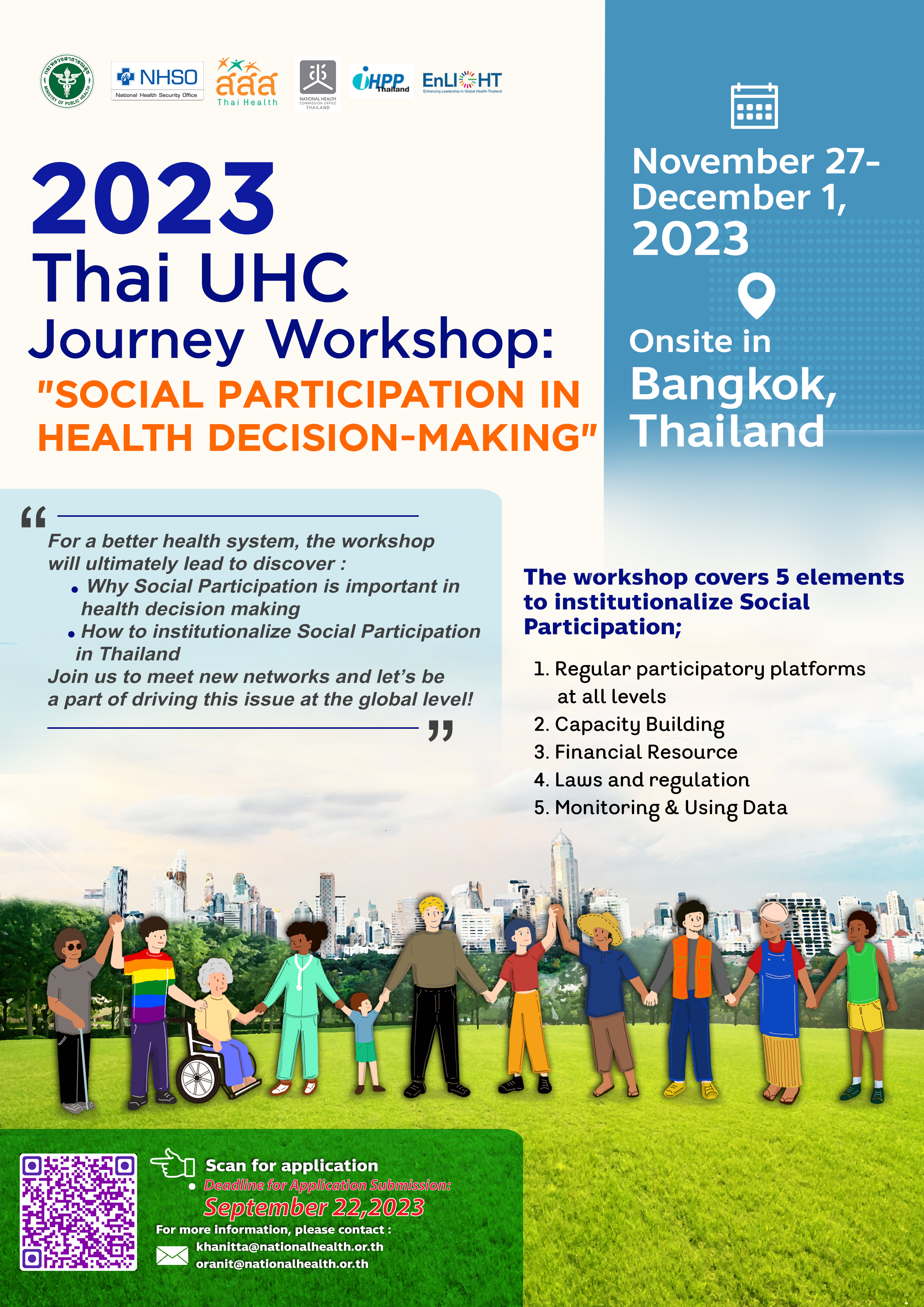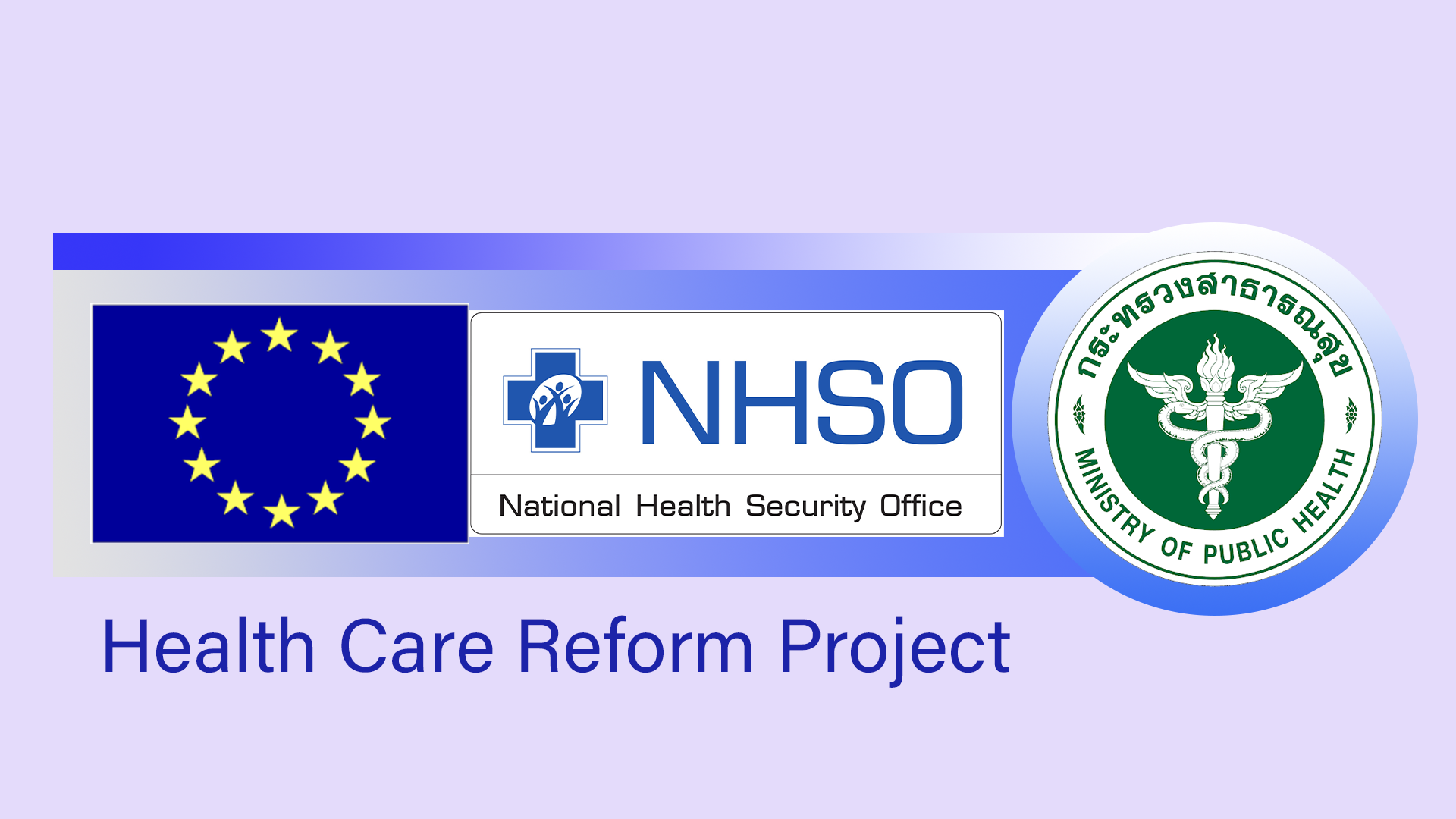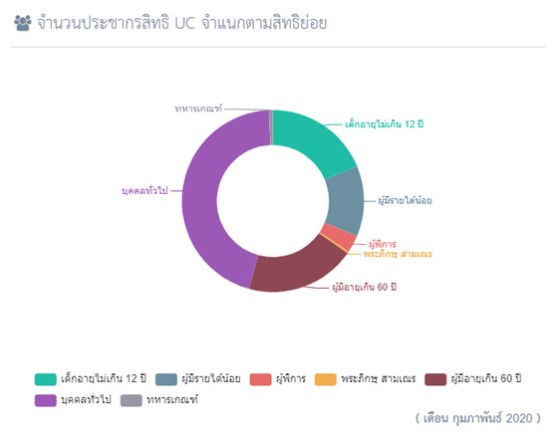Integrate PrEP provision in UHC
(1).jpg)
Dr Rattaphon Triamwichanon, Assistance Secretary-General of National Health Security Office (NHSO)
Three decades ago, HIV/AIDS was seen as a deadly disease that killed over 50,000 Thais annually during the outbreak peak in the late 1990s. Death was inevitable once individuals had contracted to HIV.
But the picture is much different today.
HIV patients can live healthy lives since after the mid-2000s, when antiretroviral therapy was introduced in the benefits package of three Thai healthcare schemes under Universal Health Coverage (UHC).
The schemes include Universal Coverage Scheme, Social Security Scheme, and Civil Servant Medical Benefits Scheme—all of which guarantee healthcare access to more than 99% of Thai population.
This progressive movement owed to the Thai government's achievement in announcing a compulsory license on the antiretroviral drug in Nov 2006, allowing the Government Pharmaceutical Organization to produce and sell efavirenz and lopinavir-ritonavir in cheap prices.
With lower cost of the drug, the Thai government can provide free antiretroviral therapy to Thai people without going bankrupt.
Moreover, in the same year, Thai government integrated the HIV care services into a benefits package of the Universal Coverage Scheme.
The services include HIV counselling and testing , prevention of mother-to-child transmission, post-exposure prophylaxis, laboratory testing to monitor HIV treatment, counselling and positive prevention (a method of reducing HIV transmission by involving people Living With HIV/AIDS in prevention work and strategies).
Another major factor that improve the capacity of Thailand in HIV/AIDS prevention is the participation of multi-stakeholders — from politicians, academics, civil society groups, health providers to patients living with HIV/AIDS — in putting antiretroviral therapy into the benefits package of the three healthcare schemes.
Their effort is a significant reason that Thailand can reduce AIDS-related deaths by 60% since the peak in 2004, according to the UNAIDS figure. Currently, around 300,000 HIV patients receive treatment under UHC.
But this is not the end of the story. Though the death rate has declined, we've still found 6,300 new HIV infections a year or around 15 cases a day.
Thai government has set a national target to end HIV/AIDS by achieving zero cases of new HIV infections by 2030. Therefore, we must prioritize disease prevention by reducing the chance that people will expose to HIV.
In response to the national target, the National Health Security Office (NHSO), the government agency operating Universal Coverage Scheme (UCS), has planned to introduce Pre-Exposure Prophylaxis (PrEP) in UCS benefits package.
We've targeted on HIV risk population groups including sex workers, injecting drug users, men who have sex with men, and individuals living with HIV-positive partners.
PrEP is a method for HIV-negative individuals but at a very high risk of getting HIV, to prevent them from HIV infection by taking medications every day.
According to health experts' estimation, PrEP provision would reduce Thailand's new HIV infection cases down to 1,000 cases a year — which will require 405 million baht of the annual government budget. But it will save our healthcare costs from antiretroviral therapy over time.
Since early this year, the NHSO has worked with 51 health units in 21 provinces to pilot PrEP provision. Around 2,000 individuals will be given PrEP at this stage. Then we will monitor them to see how we can improve the delivery of PrEP before we officially announce it in the UCS benefits package.
The NHSO has also planned to introduce other new HIV/AIDS relevant services including initial PrEP counseling and education, HIV pregnancy test for women, and hepatitis B surface antigen test.
Moreover, we will continue the "100% condom use" campaign because it's the most effective way to prevent sexually transmitted diseases. We will also strengthen our collaboration with HIV/AIDS patients network to eliminate stigma and discrimination against them.
IN DEPTH
Integrate PrEP provision in UHC
(1).jpg)
Dr Rattaphon Triamwichanon, Assistance Secretary-General of National Health Security Office (NHSO)
Three decades ago, HIV/AIDS was seen as a deadly disease that killed over 50,000 Thais annually during the outbreak peak in the late 1990s. Death was inevitable once individuals had contracted to HIV.
But the picture is much different today.
HIV patients can live healthy lives since after the mid-2000s, when antiretroviral therapy was introduced in the benefits package of three Thai healthcare schemes under Universal Health Coverage (UHC).
The schemes include Universal Coverage Scheme, Social Security Scheme, and Civil Servant Medical Benefits Scheme—all of which guarantee healthcare access to more than 99% of Thai population.
This progressive movement owed to the Thai government's achievement in announcing a compulsory license on the antiretroviral drug in Nov 2006, allowing the Government Pharmaceutical Organization to produce and sell efavirenz and lopinavir-ritonavir in cheap prices.
With lower cost of the drug, the Thai government can provide free antiretroviral therapy to Thai people without going bankrupt.
Moreover, in the same year, Thai government integrated the HIV care services into a benefits package of the Universal Coverage Scheme.
The services include HIV counselling and testing , prevention of mother-to-child transmission, post-exposure prophylaxis, laboratory testing to monitor HIV treatment, counselling and positive prevention (a method of reducing HIV transmission by involving people Living With HIV/AIDS in prevention work and strategies).
Another major factor that improve the capacity of Thailand in HIV/AIDS prevention is the participation of multi-stakeholders — from politicians, academics, civil society groups, health providers to patients living with HIV/AIDS — in putting antiretroviral therapy into the benefits package of the three healthcare schemes.
Their effort is a significant reason that Thailand can reduce AIDS-related deaths by 60% since the peak in 2004, according to the UNAIDS figure. Currently, around 300,000 HIV patients receive treatment under UHC.
But this is not the end of the story. Though the death rate has declined, we've still found 6,300 new HIV infections a year or around 15 cases a day.
Thai government has set a national target to end HIV/AIDS by achieving zero cases of new HIV infections by 2030. Therefore, we must prioritize disease prevention by reducing the chance that people will expose to HIV.
In response to the national target, the National Health Security Office (NHSO), the government agency operating Universal Coverage Scheme (UCS), has planned to introduce Pre-Exposure Prophylaxis (PrEP) in UCS benefits package.
We've targeted on HIV risk population groups including sex workers, injecting drug users, men who have sex with men, and individuals living with HIV-positive partners.
PrEP is a method for HIV-negative individuals but at a very high risk of getting HIV, to prevent them from HIV infection by taking medications every day.
According to health experts' estimation, PrEP provision would reduce Thailand's new HIV infection cases down to 1,000 cases a year — which will require 405 million baht of the annual government budget. But it will save our healthcare costs from antiretroviral therapy over time.
Since early this year, the NHSO has worked with 51 health units in 21 provinces to pilot PrEP provision. Around 2,000 individuals will be given PrEP at this stage. Then we will monitor them to see how we can improve the delivery of PrEP before we officially announce it in the UCS benefits package.
The NHSO has also planned to introduce other new HIV/AIDS relevant services including initial PrEP counseling and education, HIV pregnancy test for women, and hepatitis B surface antigen test.
Moreover, we will continue the "100% condom use" campaign because it's the most effective way to prevent sexually transmitted diseases. We will also strengthen our collaboration with HIV/AIDS patients network to eliminate stigma and discrimination against them.
Events
Integrate PrEP provision in UHC
(1).jpg)
Dr Rattaphon Triamwichanon, Assistance Secretary-General of National Health Security Office (NHSO)
Three decades ago, HIV/AIDS was seen as a deadly disease that killed over 50,000 Thais annually during the outbreak peak in the late 1990s. Death was inevitable once individuals had contracted to HIV.
But the picture is much different today.
HIV patients can live healthy lives since after the mid-2000s, when antiretroviral therapy was introduced in the benefits package of three Thai healthcare schemes under Universal Health Coverage (UHC).
The schemes include Universal Coverage Scheme, Social Security Scheme, and Civil Servant Medical Benefits Scheme—all of which guarantee healthcare access to more than 99% of Thai population.
This progressive movement owed to the Thai government's achievement in announcing a compulsory license on the antiretroviral drug in Nov 2006, allowing the Government Pharmaceutical Organization to produce and sell efavirenz and lopinavir-ritonavir in cheap prices.
With lower cost of the drug, the Thai government can provide free antiretroviral therapy to Thai people without going bankrupt.
Moreover, in the same year, Thai government integrated the HIV care services into a benefits package of the Universal Coverage Scheme.
The services include HIV counselling and testing , prevention of mother-to-child transmission, post-exposure prophylaxis, laboratory testing to monitor HIV treatment, counselling and positive prevention (a method of reducing HIV transmission by involving people Living With HIV/AIDS in prevention work and strategies).
Another major factor that improve the capacity of Thailand in HIV/AIDS prevention is the participation of multi-stakeholders — from politicians, academics, civil society groups, health providers to patients living with HIV/AIDS — in putting antiretroviral therapy into the benefits package of the three healthcare schemes.
Their effort is a significant reason that Thailand can reduce AIDS-related deaths by 60% since the peak in 2004, according to the UNAIDS figure. Currently, around 300,000 HIV patients receive treatment under UHC.
But this is not the end of the story. Though the death rate has declined, we've still found 6,300 new HIV infections a year or around 15 cases a day.
Thai government has set a national target to end HIV/AIDS by achieving zero cases of new HIV infections by 2030. Therefore, we must prioritize disease prevention by reducing the chance that people will expose to HIV.
In response to the national target, the National Health Security Office (NHSO), the government agency operating Universal Coverage Scheme (UCS), has planned to introduce Pre-Exposure Prophylaxis (PrEP) in UCS benefits package.
We've targeted on HIV risk population groups including sex workers, injecting drug users, men who have sex with men, and individuals living with HIV-positive partners.
PrEP is a method for HIV-negative individuals but at a very high risk of getting HIV, to prevent them from HIV infection by taking medications every day.
According to health experts' estimation, PrEP provision would reduce Thailand's new HIV infection cases down to 1,000 cases a year — which will require 405 million baht of the annual government budget. But it will save our healthcare costs from antiretroviral therapy over time.
Since early this year, the NHSO has worked with 51 health units in 21 provinces to pilot PrEP provision. Around 2,000 individuals will be given PrEP at this stage. Then we will monitor them to see how we can improve the delivery of PrEP before we officially announce it in the UCS benefits package.
The NHSO has also planned to introduce other new HIV/AIDS relevant services including initial PrEP counseling and education, HIV pregnancy test for women, and hepatitis B surface antigen test.
Moreover, we will continue the "100% condom use" campaign because it's the most effective way to prevent sexually transmitted diseases. We will also strengthen our collaboration with HIV/AIDS patients network to eliminate stigma and discrimination against them.
RESOURCE CENTER
SECRETARY-GENERAL
Integrate PrEP provision in UHC
(1).jpg)
Dr Rattaphon Triamwichanon, Assistance Secretary-General of National Health Security Office (NHSO)
Three decades ago, HIV/AIDS was seen as a deadly disease that killed over 50,000 Thais annually during the outbreak peak in the late 1990s. Death was inevitable once individuals had contracted to HIV.
But the picture is much different today.
HIV patients can live healthy lives since after the mid-2000s, when antiretroviral therapy was introduced in the benefits package of three Thai healthcare schemes under Universal Health Coverage (UHC).
The schemes include Universal Coverage Scheme, Social Security Scheme, and Civil Servant Medical Benefits Scheme—all of which guarantee healthcare access to more than 99% of Thai population.
This progressive movement owed to the Thai government's achievement in announcing a compulsory license on the antiretroviral drug in Nov 2006, allowing the Government Pharmaceutical Organization to produce and sell efavirenz and lopinavir-ritonavir in cheap prices.
With lower cost of the drug, the Thai government can provide free antiretroviral therapy to Thai people without going bankrupt.
Moreover, in the same year, Thai government integrated the HIV care services into a benefits package of the Universal Coverage Scheme.
The services include HIV counselling and testing , prevention of mother-to-child transmission, post-exposure prophylaxis, laboratory testing to monitor HIV treatment, counselling and positive prevention (a method of reducing HIV transmission by involving people Living With HIV/AIDS in prevention work and strategies).
Another major factor that improve the capacity of Thailand in HIV/AIDS prevention is the participation of multi-stakeholders — from politicians, academics, civil society groups, health providers to patients living with HIV/AIDS — in putting antiretroviral therapy into the benefits package of the three healthcare schemes.
Their effort is a significant reason that Thailand can reduce AIDS-related deaths by 60% since the peak in 2004, according to the UNAIDS figure. Currently, around 300,000 HIV patients receive treatment under UHC.
But this is not the end of the story. Though the death rate has declined, we've still found 6,300 new HIV infections a year or around 15 cases a day.
Thai government has set a national target to end HIV/AIDS by achieving zero cases of new HIV infections by 2030. Therefore, we must prioritize disease prevention by reducing the chance that people will expose to HIV.
In response to the national target, the National Health Security Office (NHSO), the government agency operating Universal Coverage Scheme (UCS), has planned to introduce Pre-Exposure Prophylaxis (PrEP) in UCS benefits package.
We've targeted on HIV risk population groups including sex workers, injecting drug users, men who have sex with men, and individuals living with HIV-positive partners.
PrEP is a method for HIV-negative individuals but at a very high risk of getting HIV, to prevent them from HIV infection by taking medications every day.
According to health experts' estimation, PrEP provision would reduce Thailand's new HIV infection cases down to 1,000 cases a year — which will require 405 million baht of the annual government budget. But it will save our healthcare costs from antiretroviral therapy over time.
Since early this year, the NHSO has worked with 51 health units in 21 provinces to pilot PrEP provision. Around 2,000 individuals will be given PrEP at this stage. Then we will monitor them to see how we can improve the delivery of PrEP before we officially announce it in the UCS benefits package.
The NHSO has also planned to introduce other new HIV/AIDS relevant services including initial PrEP counseling and education, HIV pregnancy test for women, and hepatitis B surface antigen test.
Moreover, we will continue the "100% condom use" campaign because it's the most effective way to prevent sexually transmitted diseases. We will also strengthen our collaboration with HIV/AIDS patients network to eliminate stigma and discrimination against them.
VIDEOS
Thailand's UHC Journey
UHC Public relations












